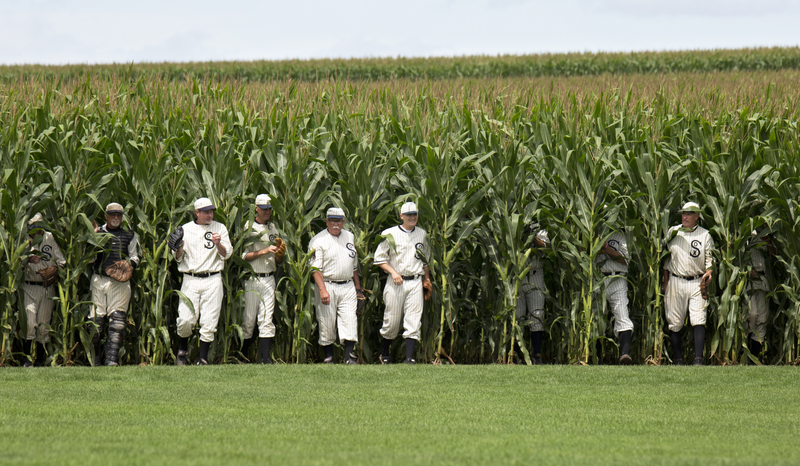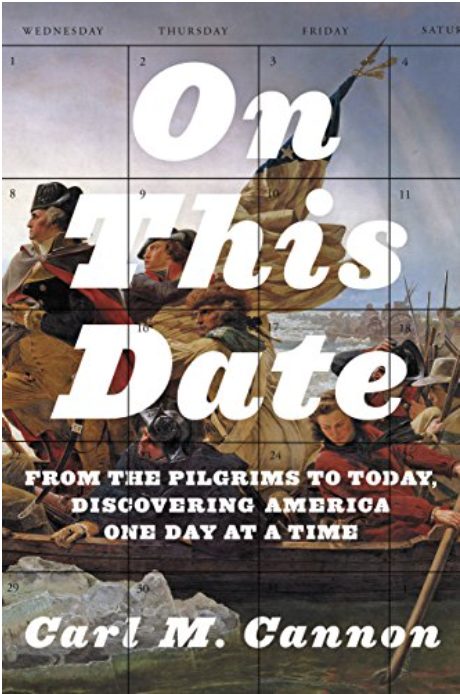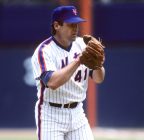Great American Stories: Field of Dreams

Two years ago, on the 30th anniversary of the film's release, Major League Baseball announced that it would play a game in the same Iowa cornfield where the movie was set. Last night it happened, and no one could have imagined how well it would turn out. Tweet

Good morning, it’s Friday, Aug. 13, 2021, the day of the week when I reprise quotations intended to be uplifting or educational. Today’s comes from a writer named W.P. Kinsella. It’s not the first time. I’ve previously reprised a different line from “Shoeless Joe,” Kinsella’s timeless baseball novel that was made into “Field of Dreams,” a Hollywood blockbuster set in an Iowa cornfield.
Two years ago, on the 30th anniversary of the film’s release, Major League Baseball announced that it would play a game in the same Iowa cornfield where the movie was set. Last night it happened, and no one could have imagined how well it would turn out. Yes, the Fox Sports’ production included the expected over-emoting from play-by-play man Joe Buck and meandering guest commentary from Kevin Costner, but that’s nitpicking. The clips of scenes from the movie, shown between innings; were evocative; the sunsets over the cornfield were spectacular. The game itself, which included three two-run homers in the 9th inning, had an unscripted Hollywood ending that had to be seen to be believed. But all is not well in the world of professional baseball, and the hope of many fans who watched last night will be that the stewards of the game admit their sins and begin to change their ways.
To save his family farm, Ray Kinsella builds a ballpark in an Iowa cornfield. This was the key plot point in both W.P. Kinsella’s novel “Shoeless Joe,” and the Hollywood version shepherded onto the screen by Phil Alden Robinson, an adaptation so skillful it brought the novelist himself to tears. It was nice to see Fox News reprise James Earl Jones’ “build it and they will come” speech, but baseball fans in Washington have had a qualitatively different experience this season. We built a stadium — not in a cornfield, but in the middle of America’s capital city — and this season, most of the best players left.
Not of their own volition, mind you. They were traded because the Nats’ brass decided to give up on the season — and save money. The result is that, in some basic respects, this is the second consecutive summer in D.C. without baseball. Oh, there’s a team out there each day. (They lost two games again yesterday.) And, yes, Juan Soto is still here, for now anyway, and the timeless Ryan Zimmerman graced us for one last season. But who are the rest of these guys?
For the third straight year the Washington Nationals let their best all-around player leave – except that this time they sent him away. At the mid-season trading deadline, they dealt away Trea Turner, their exciting and exquisitely talented shortstop who played hurt almost all season in their World Series year. Along with Max Scherzer, Trea was shipped to the Los Angeles Dodgers — the defending World Series champs — for prospects. A future Hall of Famer, Scherzer was the ace of their pitching staff and team leader.
That wasn’t all. Slugging left-fielder Kyle Schwarber, whom Nats’ fans were coming to love? Gone. Steady and underrated catcher Yan Gomes? Gone. Josh Harrison, a player with enough game and self-confidence to good-naturedly exchange banter with opposing fans from the outfield? Gone.
The team traded or released eight or nine players in all, a third of their roster in this midseason fire sale. The Nationals act as though loyalties can be bought and sold along with MLB contracts. Predictably, they’ve lost 12 of 15 games since the trades.
The business of baseball. That’s what they call it. Greed is a better word. The owners of the Chicago Cubs did the same thing to Cubbies fans in July. It’s an annual ritual now around baseball, and getting worse every year. But although it isn’t new, once upon a time there was a limit to it, meaning that the owners, players, and agents didn’t want to hurt the game itself. They wanted it to grow. Today, the owners, with help from the commissioner’s office and the players’ union, are eating their seed corn. Now we have four-hour baseball games in which 24% of the at-bats end up in strikeouts. World Series games that start so late kids can’t watch ’em. Obscene television contracts like the one in Los Angeles that aggressively block a majority of people in Southern California from ever seeing the team.
Baseball was once the “National Pastime.” Not any longer. The National Football League draft draws more viewers than most World Series games.
If fans in half the MLB cities know at the outset of the season that their team cannot contend this year — or next — how is this sustainable? If you charge $135 for a team jersey with a player’s name on it, and trade the player for “cash considerations” — or you charge an average of $100 per ticket (with $50 parking, $12 beers and $6 hot dogs) and then trade most of your good players in midseason — should season ticket holders get a refund? Of course they should, but don’t hold your breath.
Baseball was designed to break your heart, the great Bart Giamatti reminded us. Those of us who love the game — even Yankee fans and Dodger fans — we get that. But it wasn’t designed to make us feel like chumps. Hidden among the magic realism in “Shoeless Joe” is a warning for the Lords of Baseball. It comes when the story’s protagonist tracks down Moonlight Graham in a rural Minnesota town where Graham, in old age, is a beloved local doctor, his playing days long behind him.
“You’re not from around here,” Doc Graham says while carefully sizing up young Ray Kinsella.
“No, from Iowa,” Ray replies.
“I’ve been there,” Graham says. “Took the train down to Iowa City once — to the medical center. They have fine equipment there. And once to Council Bluffs. The Blue Streaks were in a tournament.”
“Baseball?” Kinsella asks.
“No, basketball,” says Doc Graham. “Baseball’s not that big around here. Season’s too short. Football’s the game around here. But you learn to adapt. Any game becomes important when you know and love the players.”
And that’s your quote of the week.
Carl M. Cannon is the Washington bureau chief for RealClearPolitics. Reach him on Twitter @CarlCannon.










